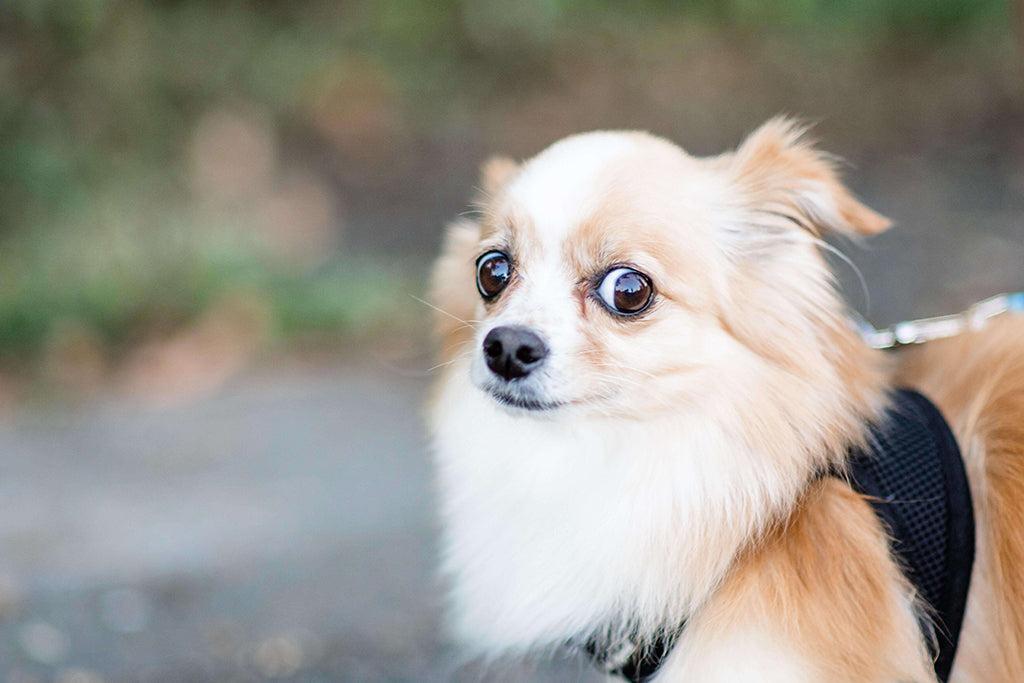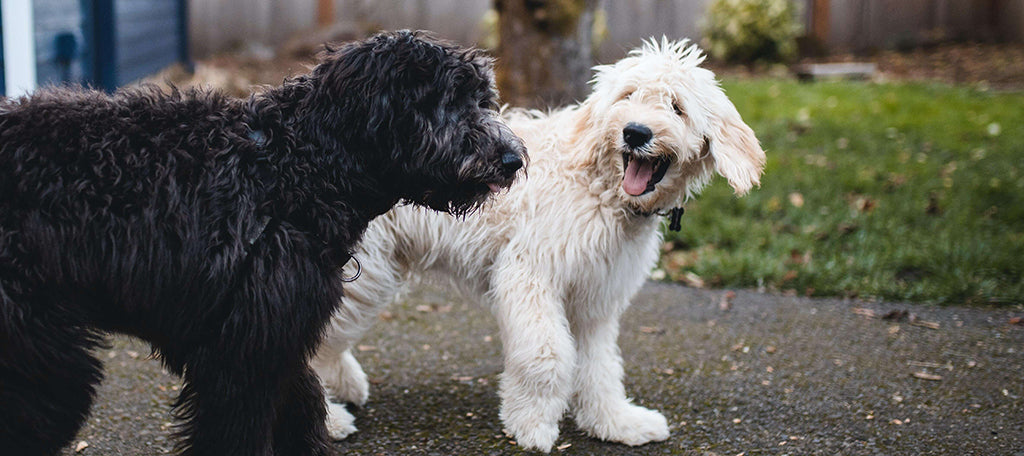If you’re wondering “why is my dog scared of everything?”, in this blog, we’ll learn what dogs are scared of. We’ll discover why dogs get scared, what causes fear anxiousness in dogs, and how to support relaxed behavior.
Why Is My Dog Acting Scared?

For many of us, our dog’s fears are obvious: fireworks, thunder, the vacuum cleaner, and the reasons behind these fears are pretty clear too – they’re really loud and intimidating!
But, being fearful of certain things as a dog is more common than you may think. However, this only means there are some tried and tested ways that may help your frightened dog out…
Why Is My Dog Acting Scared?
Fear anxiousness in dogs can be expressed in many ways. When a dog is scared they may:
- Shake
- Hide
- Cower/Put their tail between their legs
- Whine/Howl/Vocalize
- Bark
- Seem aggressive (fear reactivity)
It’s important to remember that fear is a defense mechanism that can serve your dog in dangerous situations so we don’t want to eradicate the instinctive behavior completely. But, if a particular fear is posing a threat to other household members or impacting your dog’s quality of life it’s definitely something we need to try and help them with.
Just like when people have phobias, some fear anxiousness in dogs can go beyond rational like an intense fear of thunder or fireworks. Unfortunately, unlike humans, you can’t explain to a dog what thunder or a firework is and so can’t soothe them with the fact it’s temporary. Phobias are typically the result of previous experiences and in humans, these experiences have usually been repeated a few times. In dogs, just one bad experience is enough to instill a phobia.
Most dog phobias will develop at the onset of a pup’s maturity, so between 12-36 months of age. But, despite an owner’s best efforts to stop the anxiousness in its tracks, phobias and fear anxiousness in dogs can still occur.

The Most Common Fears In Dogs
The most common fears and phobias dogs experience include:
Sound phobia; so, thunder, fireworks, hair driers, vacuum cleaners, etc. Herding breeds tend to be more affected by this type of phobia (e.g. Collies)
Situational phobia; loneliness, for example. This is when your dog doesn’t understand that you will be coming back and experiences intense anxiousness as a result.
Scared of strangers; dogs that have been rescued most commonly experience a fear of people they don’t know – usually men or perhaps people who wear hats or sunglasses. This is usually because they’ve had a negative experience or received abuse from someone dressed like this or from a certain sex.
Veterinarian phobia; in a similar way to human beings developing a fear of the dentist, your dog may have a fear of going to the vet. This is because, even though the visit is in their best interest, they usually associate attending the vet with feeling unwell, being in discomfort, car rides, and meeting strangers and this is has been perceived as a stressful, negative experience to be feared by your dog.
How To Help A Frightened Dog
First things first; your dog is going to need you to extend your patience, kindness, and consistency with helpful, ethical training. Looking after a scared dog can be frustrating and tiring, but your dog’s phobia is not their fault and you shouting at them or losing control will only make the matter worse and stress your dog out more. It may even lead them to develop another fear – of you!
Ignoring the issue won’t help either. Phobias in dogs simply worsen with time if they’re not approached. You should always go and have a chat with your vet if you’re struggling to manage their specific phobia or simply don’t know where to begin with addressing the fear anxiousness in your dog and obtain some professional advice.

Then you can attempt to help out your frightened dog at home with behavior modification training, in particular working on their obedience training. When a triggering situation is happening, be mindful not to say “good dog” to them, as this can be perceived as a reward for this behavior, as can petting. Try simply asking your dog to “sit” or “stay” when a situation is happening and keep their focus on the task you’ve asked of them to help distract them from the trigger. This is usually more helpful with phobias where the dog is scared of a sound you can control (the hair drier or vacuum cleaner) or when they’re scared of strangers.
Alternatively, if they’re anxious about the vet, or of fireworks or thunder, simply placing a hand on them and applying light pressure can help calm your pup down, as opposed to petting. It will help them feel like you’re in control and are going to protect them.
Remember, it can take several weeks to train a dog into a new behavior, so if their phobia is of fireworks or thunder, these may not occur regularly enough to train them out of.
Preparation can also be a massive help when dealing with a scared dog. If you know a thunderstorm is coming or a fireworks event is taking place (like New Year’s Eve or 4th July), get prepared with supporting your dog in advance.
Related reads:
How to Keep Your Dog Calm During Fireworks
Can Dogs Suffer From ADHD-Like Behavior?
Is it Safe to Give Your Dog Melatonin for Anxiety?
Sources
Author Burke, Anna “Common Fears And Phobias In Dogs And How To Help Treat Them” Jul 03. 2018, American Kennel Club https://www.akc.org/expert-advice/training/common-fears-and-phobias-in-dogs/
“Recognizing Abnormal Stress Response And Anxiety In Dogs” Pet Hub https://www.pethub.com/article/recognizing-abnormal-stress-and-anxiety-dogs
 S
S



